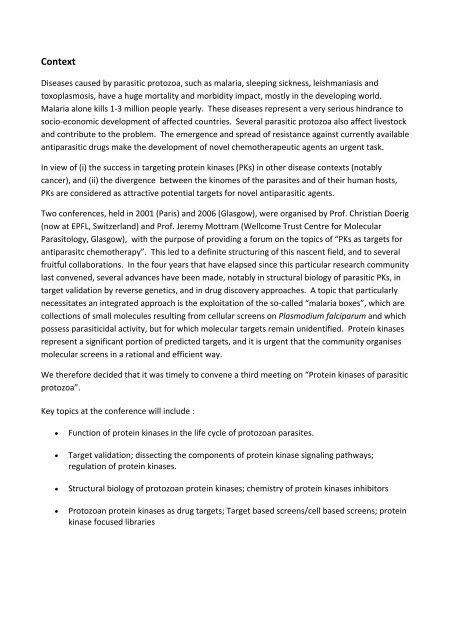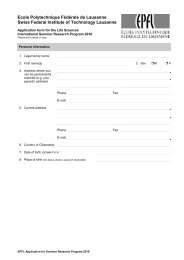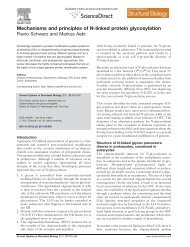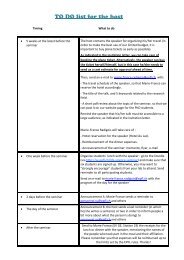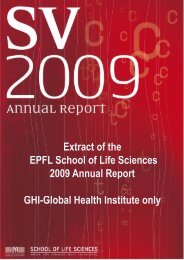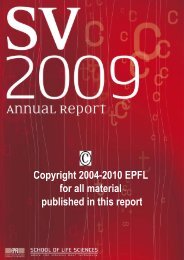3 Conference on Protein Kinases of Parasitic Protozoa - EPFL
3 Conference on Protein Kinases of Parasitic Protozoa - EPFL
3 Conference on Protein Kinases of Parasitic Protozoa - EPFL
You also want an ePaper? Increase the reach of your titles
YUMPU automatically turns print PDFs into web optimized ePapers that Google loves.
C<strong>on</strong>textDiseases caused by parasitic protozoa, such as malaria, sleeping sickness, leishmaniasis andtoxoplasmosis, have a huge mortality and morbidity impact, mostly in the developing world.Malaria al<strong>on</strong>e kills 1‐3 milli<strong>on</strong> people yearly. These diseases represent a very serious hindrance tosocio‐ec<strong>on</strong>omic development <strong>of</strong> affected countries. Several parasitic protozoa also affect livestockand c<strong>on</strong>tribute to the problem. The emergence and spread <strong>of</strong> resistance against currently availableantiparasitic drugs make the development <strong>of</strong> novel chemotherapeutic agents an urgent task.In view <strong>of</strong> (i) the success in targeting protein kinases (PKs) in other disease c<strong>on</strong>texts (notablycancer), and (ii) the divergence between the kinomes <strong>of</strong> the parasites and <strong>of</strong> their human hosts,PKs are c<strong>on</strong>sidered as attractive potential targets for novel antiparasitic agents.Two c<strong>on</strong>ferences, held in 2001 (Paris) and 2006 (Glasgow), were organised by Pr<strong>of</strong>. Christian Doerig(now at <strong>EPFL</strong>, Switzerland) and Pr<strong>of</strong>. Jeremy Mottram (Wellcome Trust Centre for MolecularParasitology, Glasgow), with the purpose <strong>of</strong> providing a forum <strong>on</strong> the topics <strong>of</strong> “PKs as targets forantiparasitc chemotherapy”. This led to a definite structuring <strong>of</strong> this nascent field, and to severalfruitful collaborati<strong>on</strong>s. In the four years that have elapsed since this particular research communitylast c<strong>on</strong>vened, several advances have been made, notably in structural biology <strong>of</strong> parasitic PKs, intarget validati<strong>on</strong> by reverse genetics, and in drug discovery approaches. A topic that particularlynecessitates an integrated approach is the exploitati<strong>on</strong> <strong>of</strong> the so‐called “malaria boxes”, which arecollecti<strong>on</strong>s <strong>of</strong> small molecules resulting from cellular screens <strong>on</strong> Plasmodium falciparum and whichpossess parasiticidal activity, but for which molecular targets remain unidentified. <strong>Protein</strong> kinasesrepresent a significant porti<strong>on</strong> <strong>of</strong> predicted targets, and it is urgent that the community organisesmolecular screens in a rati<strong>on</strong>al and efficient way.We therefore decided that it was timely to c<strong>on</strong>vene a third meeting <strong>on</strong> “<strong>Protein</strong> kinases <strong>of</strong> parasiticprotozoa”.Key topics at the c<strong>on</strong>ference will include :• Functi<strong>on</strong> <strong>of</strong> protein kinases in the life cycle <strong>of</strong> protozoan parasites.• Target validati<strong>on</strong>; dissecting the comp<strong>on</strong>ents <strong>of</strong> protein kinase signaling pathways;regulati<strong>on</strong> <strong>of</strong> protein kinases.• Structural biology <strong>of</strong> protozoan protein kinases; chemistry <strong>of</strong> protein kinases inhibitors• <strong>Protozoa</strong>n protein kinases as drug targets; Target based screens/cell based screens; proteinkinase focused libraries


